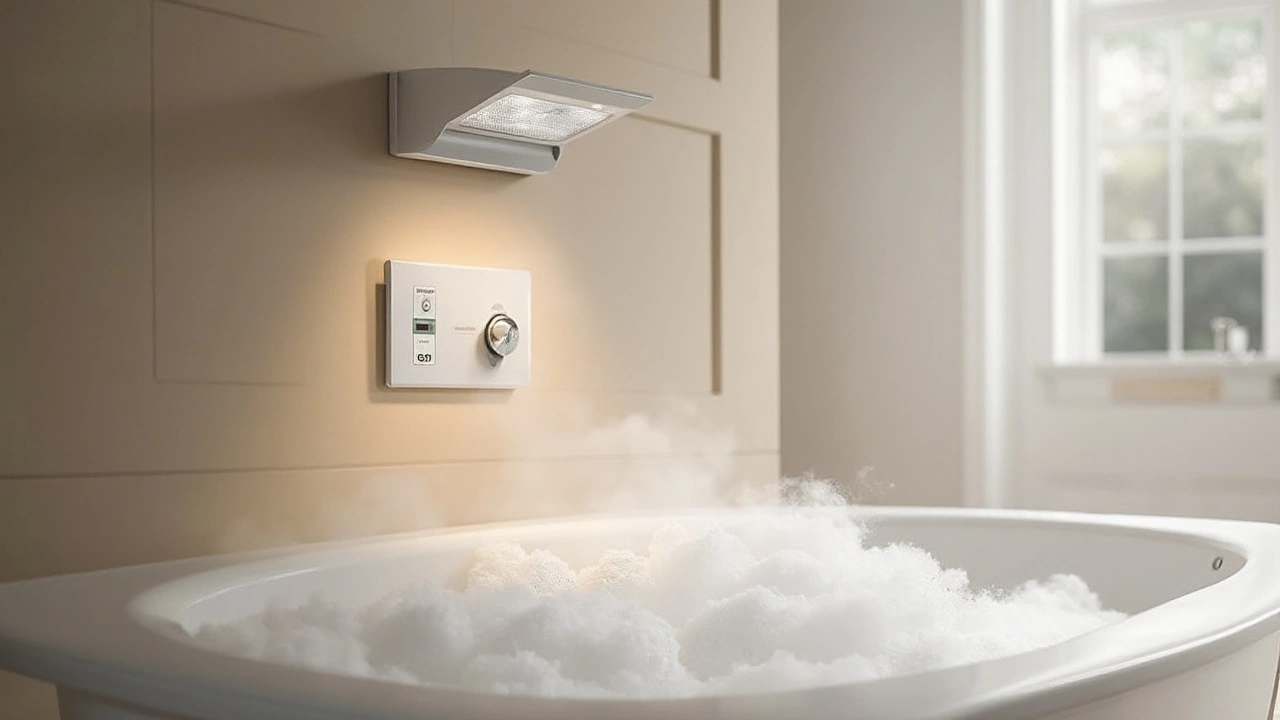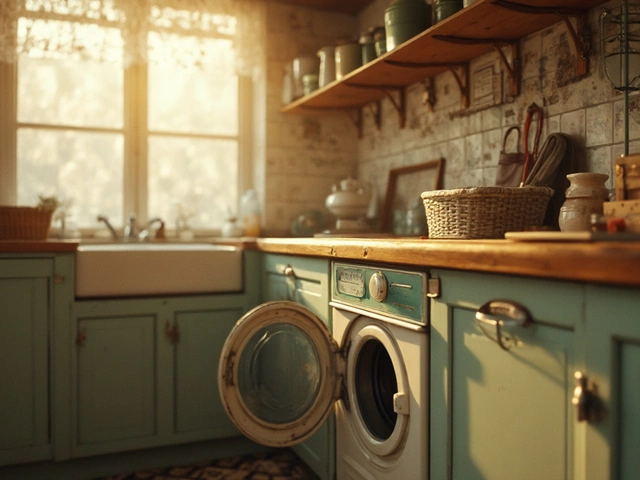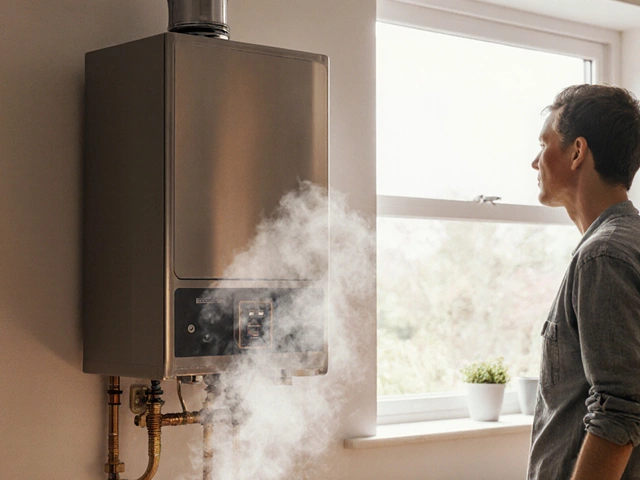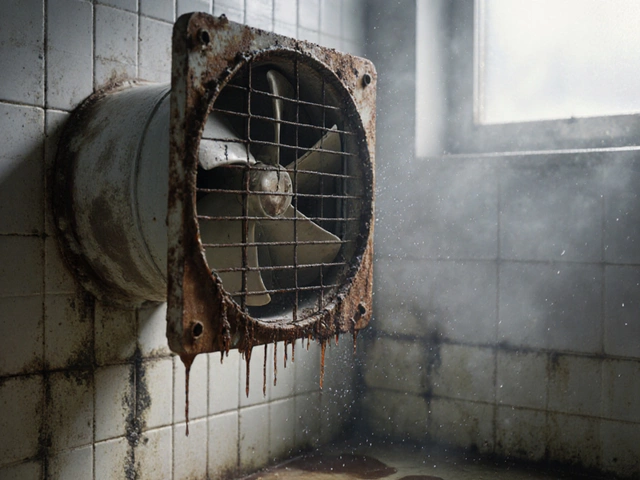Extractor fans are a staple in many homes, tasked with the essential job of improving indoor air quality by ushering away unwanted moisture, odors, and cooking fumes. But a common question that arises among homeowners is whether it's wise or efficient to leave these fans running for extended periods. Doing so might seem convenient, yet it begs an examination of energy use, cost implications, and the wear and tear on the fan itself.
In this insightful exploration, we'll look into how extractor fans work and what benefits they bring when used correctly. We'll also break down energy consumption aspects to help you understand the impact on your utility bill. Keeping safety in mind, we'll share some practical maintenance tips to ensure your fan remains in good working order. Ultimately, we'll guide you through making informed decisions about when and how long to operate this vital appliance.
- Purpose of Extractor Fans
- Energy Consumption and Cost Implications
- Impact on Indoor Air Quality
- Safety and Maintenance Tips
- Deciding When to Use Your Extractor Fan
Purpose of Extractor Fans
Extractor fans serve a crucial role in maintaining the quality of air within various environments, whether it’s your kitchen, bathroom, or any other space in need of ventilation. At their core, these devices are designed to expel stale air, replacing it with fresh air from outside. This goes beyond mere comfort as it directly impacts health and safety by mitigating issues related to humidity or the presence of harmful pollutants. In kitchens, extractor fans play a pivotal part in removing smoke, steam, and strong odors that develop from cooking, ensuring that the air remains breathable and pleasant. By doing so, they help maintain an environment devoid of excessive particles that can affect breathing conditions or trigger allergies. Bathrooms benefit similarly, as the fans assist in lowering humidity levels that, if left unchecked, could lead to mold and mildew growth—potential health risks that also compromise building integrity. By facilitating airflow, these fans enhance living conditions by regulating temperature and humidity, creating a balanced and healthier atmosphere.
The impact of extractor fans on energy efficiency is often more noticeable than one might think. These devices directly prevent the buildup of moisture, which, if uncontrolled, can lead to condensation issues and eventual structural deterioration, particularly in cooler climates. In terms of energy use, extractor fans work efficiently to stabilize internal environments, and the cost of running these modest appliances is generally offset by the savings from preventing more significant and costly maintenance issues. According to the Consortium for Energy Efficiency, proper use of ventilation can enhance a building’s energy efficiency by up to 25%. Though sometimes considered secondary in importance to other household appliances, the role of extractor fans in maintaining a sustainable practice cannot be understated. Their ability to regulate air flow and improve indoor air quality makes them indispensable in achieving an optimal home environment.
"Proper ventilation, particularly in energy-efficient homes, is fundamental not only to structural health but also to the well-being of its occupants." - Indoor Air Quality Association
Beyond preventing issues, the significance of extractor fans as a home feature lies also in their capacity to offer a calming haven free from bothersome humidity. Used strategically, not only do they enhance air quality but they also significantly contribute to the preservation of home interiors, safeguarding furniture, and appliances from excess moisture damage. This preventative action is key to extending the lifetime of the home’s decor and infrastructure, revealing the fan’s utility as a multi-functional tool for home maintenance. When assessing their value within a home, extractor fans should not be seen just as optional fixtures but as vital components of a comprehensive approach to indoor environmental management, tailored to fit both the immediate and prolonged needs of modern living spaces.
Energy Consumption and Cost Implications
When it comes to the thought of keeping your extractor fan running continuously, the question of energy consumption looms large. These appliances, though not the heftiest electricity guzzlers in a household, do contribute to your monthly utility bill. Typically, extractor fans vary in power draw; bathroom fans might consume between 15 to 60 watts, while kitchen models can climb higher, often using 100 to 250 watts. This power usage might seem minimal compared to your fridge or heating system, but running it nonstop adds up over time, especially if left unchecked.
Let’s do a simple breakdown: If a kitchen extractor fan runs for an uninterrupted 24 hours at a moderate power usage of 150 watts, you'd be looking at about 3.6 kWh per day. Multiplied across a 30-day month, that’s over 100 kWh solely from the fan. Now, considering the average rate of electricity in the U.S. hovers around 13 cents per kWh, this translates into approximately 13 dollars added to your monthly bill. In homes with multiple fans operating, these costs could climb appreciably.
Many folks might not realize that using extractor fans effectively contributes more to cost-saving than mere shutting off. A strategic on-and-off approach, running the fan during high-moisture activities such as cooking or showers, decompresses this energy burden significantly. Modern extractor models are often equipped with efficient EC (electronically commutated) motors, using less power while delivering effective airflow. Incorporating energy-efficient models is a smart way to balance household ventilation with energy efficiency.
There’s also a technology angle: Smart home systems now allow better control, timing the operation of your fans using sensors tied to humidity levels or air quality. This automation can lead to further energy savings, optimizing fan usage only when necessary. The International Energy Agency indicates that integrating even modest smart tech in the home could trim energy bills by 10-20% annually. The initial cost of these models can be offset by the long-term savings accrued through their efficient operation.
According to David Bliss, an energy consultant, "Understanding the balance between necessary fan use and energy efficiency is key. Educators must focus on the end user's awareness of energy implications as much as on appliance performance."
While there are many variables at play—from the type of fan and its placement to the local cost per kilowatt-hour—adopting smart home practices can go a long way. It is crucial to consider all these aspects to minimize costs while ensuring the effective operation of your home ventilation systems. Attending to energy consumption isn’t just about shaving dollars off your monthly statement; it's also about making conscientious ecological choices that contribute to a sustainable living environment.

Impact on Indoor Air Quality
The quality of air within your home is an aspect that can significantly affect both comfort and health. Extractor fans play a pivotal role in maintaining this quality by purging excess moisture, undesirable odors, and particulate matter from your living space. These fans are particularly crucial in areas like kitchens and bathrooms, where moisture from cooking or hot showers can accumulate quickly. If left unattended, this moisture can lead to mold growth, which can be detrimental not only to building materials but more importantly, to your health.
The science behind how extractor fans improve indoor air quality lies in their ability to create a flow of air that transports indoor pollution to the outside. When cooking, for example, numerous impurities such as nitrogen dioxide and carbon monoxide can be released into the air. Without proper ventilation provided by an efficient fan, these pollutants can linger and potentially cause respiratory issues for the inhabitants. Adequate ventilation systems ensure that the air you breathe is replenished with fresh air, significantly reducing the concentration of airborne pollutants.
Home ventilation experts suggest that the fan's capacity should match the space it serves. This ensures the fan can fully exchange the air in the room multiple times per hour, generally recommended to be between 5 to 10 times. For example, a kitchen situated in an open layout living space requires a more powerful unit compared to a smaller, enclosed bathroom. Using the correct fan size optimizes air quality management and energy efficiency. As a quote from a notable study on home ventilation published in a respected engineering journal stated,
"Proper ventilation and specifically the use of an appropriately sized *extractor fan* can reduce indoor air pollutants by upwards of 50%."This highlights the significance of employing the right equipment for the job.
Beyond the immediate removal of pollutants, employing an extractor fan effectively can have lasting benefits on your home’s environment and the health of its inhabitants. A poorly ventilated home can harbor allergens like dust mites and pet dander, contributing to allergic reactions or even asthma attacks. In environments where fans are constantly running, yet not sized appropriately, this can lead to a false sense of security regarding air quality.
It's worth noting that studies have shown that homes with effective ventilation systems in place often report lower levels of indoor pollutants and higher overall satisfaction with air quality. Thus, utilizing a well-suited and maintained extractor fan is not just about energy efficiency and cost.implcations; it's an investment in health and quality of life. Make sure to clean and maintain your fan regularly to ensure it operates efficiently. A mismanaged fan system can circulate contaminants, rather than expel them, so routine checks and maintenance can't be ignored in your quest for pure, clean air.
Safety and Maintenance Tips
To keep your extractor fan performing optimally, it is crucial to pay attention to its safety protocols and maintenance routines. These small but mighty appliances can greatly enhance air quality, but only if they function correctly and safely. One of the first steps to ensure the fan’s longevity is periodic cleaning. Dust and grease tend to accumulate over time, especially in kitchen settings. It is recommended to clean the fan every few months; this prevents build-up that could hinder the motor’s efficiency or cause it to overheat. Use a gentle cleaning solution or a mixture of vinegar and water for an eco-friendly clean, taking care to reach each nook and cranny while the fan stands unplugged.
Another key aspect to consider is professional inspection and servicing. Although many people opt for DIY approaches, it is often beneficial to have an expert periodically inspect your fan. These professionals can identify issues that might not be apparent to the untrained eye. Faulty wiring, for example, can lead to operational problems or safety hazards. Regular inspection ensures everything is wired correctly and functioning without hiccups, preventing risks. If you are unsure about when or how often this should be done, scheduling an annual check-up is a safe bet.
Using an extractor fan responsibly also means being mindful of its energy efficiency. Some models come equipped with auto-shutoff features, which help conserve energy by turning the fan off after a preset time. If your existing fan doesn’t come with such technology, it may be worth considering an upgrade. This not only saves energy but also reduces the monthly energy costs associated with prolonged use. For homes with higher moisture levels, such technology can be a game-changer, balancing necessary ventilation without over-straining your utility budget.
For those tackling maintenance on their own, it can be useful to familiarize yourself with the fan’s manual, if available. This often-overlooked resource provides valuable insights into specific maintenance needs and safe repair procedures particular to your model, which can range widely. Take, for instance, the importance of replacing or cleaning filters, common in kitchen extractor fans. The filters are designed to trap smoke, grease, and cooking smells, so it’s advisable to examine them monthly and replace or clean them as needed to maintain home ventilation quality.
"Regular maintenance can extend the life of your appliances by several years," notes Lisa Wilson, a renowned home appliance expert writer.
| Maintenance Task | Suggested Frequency |
|---|---|
| Filter Replacement/Cleaning | Monthly |
| Exterior Dusting | Weekly |
| Full Clean | Quarterly |
| Professional Inspection | Yearly |
Safety ties intrinsically to maintenance, as ensuring your fan’s integrity means protecting your household. Avoid using your extractor fan in excessively humid conditions unless it's designed for it, as some units can short circuit when exposed to moisture beyond their capacity. Artificially prolonging usage can sometimes risk overheating, especially in older or less efficient models. Keeping a fire extinguisher nearby in case of an unlikely emergency is a practical precaution, ensuring you’re prepared for any situation. The best practice is always staying informed on the specific capabilities and limits of your appliance.

Deciding When to Use Your Extractor Fan
Determining the optimal time to run an extractor fan might appear as a straightforward task, yet it requires a nuanced understanding of its purpose and the environment in which it's being used. These fans are not just tools for comfort; they serve as essential allies in combating the accumulation of moisture and pollutants within your household. Most experts recommend using them during and after cooking, bathing, or any task that might increase humidity or generate odors and smoke. This practice helps ensure that your indoor air remains fresh and healthy.
One of the primary factors in deciding when to run your home ventilation system is the level of activity in certain areas, such as the kitchen and bathroom. Cooking, especially on a stovetop, releases not only heat but also a plethora of aromas and grease particles. If left unchecked, these can settle on surfaces, creating potential hygiene issues. Similarly, showers release steam that can infiltrate walls, ceilings, and windows, promoting mold growth. Running an extractor fan helps to immediately divert these unwanted elements away, maintaining both cleanliness and structural integrity.
According to the Energy Saving Trust, "Using extractor fans with humidity sensors can further enhance energy efficiency by ensuring fans operate only when needed."
Energy efficiency is another crucial consideration. While it might seem tempting to have your fan running continuously, doing so can lead to unnecessary electricity consumption and strain on your appliance. A responsible approach is setting timers or employing sensors that activate the fan during peak times of moisture and odor production. Many modern systems now come with such smart technology, offering a balance between effective energy efficiency and performance. Regular inspection and maintenance also play a role in extending the fan’s lifespan, preventing potential malfunctions.
Consider the specific needs of your household. If you live in a busy home with frequent cooking activities and numerous showers, more regular fan usage might be necessary to protect the air quality. Conversely, if your lifestyle is comparatively low-key, running the fan less often could be sufficient. Combining scheduled use with environmental factors, such as opening windows for natural airflow when possible, can also aid in determining the best use of your fan. Ultimately, a mix of practical timing and technical guidance ensures you utilize your extractor fan efficiently for optimal air quality and long-term cost savings.





